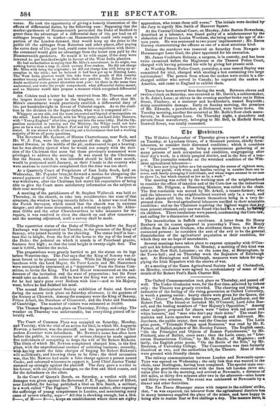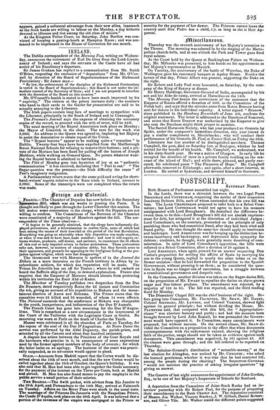Zbe Vrobintes.
The Wiltshire Independent of Thursday gives a report of a meeting on Tuesday, at Lyneham Green, of a thousand persons, chiefly farm- labourers, to consider their distressed condition ; which it considers an " important " meeting, as being a spontaneous gathering of so many persons of such occupation and condition, congregating after their day's work, in a thinly-peopled district, and in the face of a tem- pest. The journalist remarks on the wretched condition of the Wilt- shire agricultural labourers-
" We have now 13 ing before us a list containing the names of eighteen men, living in one parish, with wives, and families varying in number from one to- seven, each family averaging 6 individuals, and whose wages amount in no case to above 7s., but which descend as low as 5s. a week."
The meeting was called by the working-men of the neighbourhood to consider the effect of taxation and of the Corn-law on the industrious classes. Mr. Pillgrem, a Dissenting Minister, was called to the chair. The first resolution was moved by Mr. Arkell, a tenant-farmer ; who-. said the labourers in the neighbourhood received only 7.. a week, and in other places still less, the farmers themselves being in a very de- pressed state. Several agricultural labourers testified tc) their miserable. condition ; and on the Chairman inquiring the highest wages thaka_ny_ man present obtained, only one was found who hadts. a week, he'ftelMr six children. Three resolutions were passed, condemning the Corn-law,. and calling for a diminution of taxation.
The incendiarism in Suffolk continues. A letter from Sir Henry Bunbury on its causes appeared in yesterday's Times. Sir Henry differs from Sir James Graham, who attributes these fires to.a few dis-. contented persons : he considers the seat of the evil to be the general. dissatisfaction of the agricultural population at their condition, for which they see no hope of amendment.
Several meetings have taken place to express sympathy with O'Con- nell and his fellow-prisoners. On Monday, a meeting of this kind was held in the New Hall, Leicester ; on the same day, at Birmingham, in the Town-hall ; and on Thursday week the Repeaters of Edinburgh met. At Birmingham and Edinburgh, measures were taken for sup- plying the Irish Repeaters with the sinews of war.
At a meeting of the Essex Agricultural Society held at Chelmsford, on Monday, resolutions were agreed to, condemnatory of some of the details of Sir Robert Peel's Bank Charter Bill.
The Oxford Commemoration took place on Thursday, and passed of well. The Under-Graduates were, for the first time, admitted by tickets- only: the Theatre was greatly crowded. The cheering and hissing, as indicative of the feeling of the rising generation at Oxford University, is worth a passing notice : hearty cheers were given for the Queen, the Duke, " Doctor ' Albert, the Queen Dowager, Lord Lyndhurst, and Sir Robert Peel. The hissed-at included Mr. O'Connell, Lord John Rus- sell, and the leading members of "her Majesty's Opposition." Among other subjects proposed for cheers were "ladies with red noses and white bonnets," and "men who don't pay their debts." The usual for- malities and Latin speeches were gone through and delivered. Mr. Jacobson, the public orator, then read the Crueian oration. The Latin prize poem, " Triumphi Pompa apud Romance," was read by Mr. E. Palmer, of Balliol, nephew of Mr. Horsley Palmer. The English essay, "On the Principles and Objects of Roman Punishments," by Mr. Prichard, also of Bailin!, came next ; then the Latin essay, on " Lite- rarum Humanioruna Utilitas," by Mr. H. Smith, of Magdalen; and lastly, the English prize poem, "On the Battle of the Nile," by Mr. Brereton, of University College. The Convocation was then formally dissolved at two, and the authorities left, the Theatre. Most of them. w ere greeted with friendly cheers.
The railway communication between London and Newcastle-upon- Tyne was opened on Wednesday ; the only link that was wanted in the chain, near Darlington, having been completed. The special train con- veying the gentlemen connected with the lines left London three mi- nutes after five in the morning, and arrived at Newcastle, a distance of 303 miles, at thirty-five minutes after two in the afternoon—nine hours and thirty-two minutes. The event was celebrated at Newcastle by- a dinner and other festivities.
The Ten Towns Messenger states with respectto the colliers' strike,. that, "as was expected, the labourer from the.agricaltural districts hiss. in many instances supplied the place of the miner, and been happy in- being able to realize four or five shillings a day. The masters have, it.- appears' gained a collateral advantage from their new allies, inasmuch as the fresh hands are willing to labour on the Monday, a day hitherto devoted to idleness and riot among the old class of miners."
At the Kingston Police Court, on Saturday, John Burdon was con- victed of keeping a gaming-booth at Hampton Races ; and was sen- tenced to be imprisoned in the House of Correction for one month.



























 Previous page
Previous page